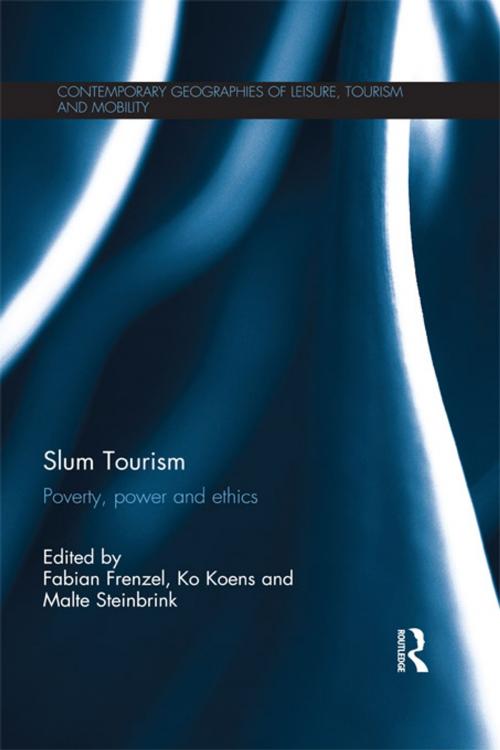Slum Tourism
Poverty, Power and Ethics
Business & Finance, Industries & Professions, Hospitality, Tourism & Travel, Nonfiction, Social & Cultural Studies, Social Science, Sociology, Travel| Author: | ISBN: | 9781136487958 | |
| Publisher: | Taylor and Francis | Publication: | June 14, 2012 |
| Imprint: | Routledge | Language: | English |
| Author: | |
| ISBN: | 9781136487958 |
| Publisher: | Taylor and Francis |
| Publication: | June 14, 2012 |
| Imprint: | Routledge |
| Language: | English |
Slum tourism is a globalizing trend and a controversial form of tourism. Impoverished urban areas have always enticed the popular imagination, considered to be places of ‘otherness’, ‘moral decay’, ‘deviant liberty’ or ‘authenticity’. ‘Slumming’ has a long tradition in the Global North, for example in Victorian London when the upper classes toured the East End. What is new, however, is its development dynamics and its rapidly spreading popularity across the globe. Township tourism and favela tourism have currently reached mass tourism characteristics in South Africa and in Rio de Janeiro, Brazil. In other countries of the Global South, slum tourism now also occurs and providers see huge growth potential.
While the morally controversial practice of slum tourism has raised much attention and opinionated debates in the media for several years, academic research has only recently started addressing it as a global phenomenon. This edition provides the first systematic overview of the field and the diverse issues connected to slum tourism. This multidisciplinary collection is unique both in its conceptual and empirical breadth. Its chapters indicate that ‘global slumming’ is not merely a controversial and challenging topic in itself, but also offers an apt lens through which to discuss core concepts in critical tourism studies in a global perspective, in particular: ‘poverty’, ‘power’ and ‘ethics’.
Building on research by prolific researchers from ten different countries, the book provides a comprehensive and unique insight in the current empirical, practical and theoretical knowledge on the subject. It takes a thorough and critical review of issues associated with slum tourism, asking why slums are visited, whether they should be visited, how they are represented, who is benefiting from it and in what way. It offers new insights to tourism's role in poverty alleviation and urban regeneration, power relations in contact zones and tourism's cultural and political implications.
Drawing on research from four continents and seven different countries, and from multidisciplinary perspectives, this ground-breaking volume will be valuable reading for students, researchers and academics interested in this contemporary form of tourism.
Slum tourism is a globalizing trend and a controversial form of tourism. Impoverished urban areas have always enticed the popular imagination, considered to be places of ‘otherness’, ‘moral decay’, ‘deviant liberty’ or ‘authenticity’. ‘Slumming’ has a long tradition in the Global North, for example in Victorian London when the upper classes toured the East End. What is new, however, is its development dynamics and its rapidly spreading popularity across the globe. Township tourism and favela tourism have currently reached mass tourism characteristics in South Africa and in Rio de Janeiro, Brazil. In other countries of the Global South, slum tourism now also occurs and providers see huge growth potential.
While the morally controversial practice of slum tourism has raised much attention and opinionated debates in the media for several years, academic research has only recently started addressing it as a global phenomenon. This edition provides the first systematic overview of the field and the diverse issues connected to slum tourism. This multidisciplinary collection is unique both in its conceptual and empirical breadth. Its chapters indicate that ‘global slumming’ is not merely a controversial and challenging topic in itself, but also offers an apt lens through which to discuss core concepts in critical tourism studies in a global perspective, in particular: ‘poverty’, ‘power’ and ‘ethics’.
Building on research by prolific researchers from ten different countries, the book provides a comprehensive and unique insight in the current empirical, practical and theoretical knowledge on the subject. It takes a thorough and critical review of issues associated with slum tourism, asking why slums are visited, whether they should be visited, how they are represented, who is benefiting from it and in what way. It offers new insights to tourism's role in poverty alleviation and urban regeneration, power relations in contact zones and tourism's cultural and political implications.
Drawing on research from four continents and seven different countries, and from multidisciplinary perspectives, this ground-breaking volume will be valuable reading for students, researchers and academics interested in this contemporary form of tourism.















